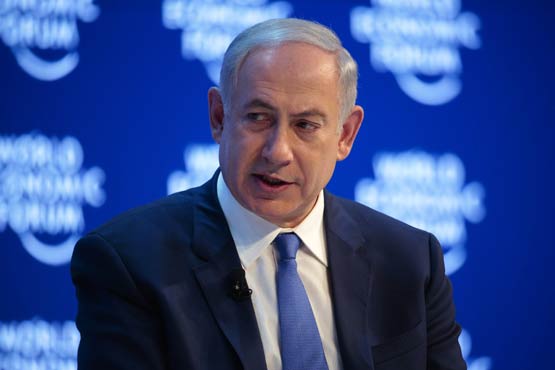 Bloomberg photo by Jason Alden
Bloomberg photo by Jason Alden
Prime Minister Benjamin Netanyahu's approach to Israel's international relations is changing.
Criticized by U.S. and European leaders over his policies toward the Palestinians, the Israeli leader is cultivating allies in other parts of the world that share economic interests and enemies.
Netanyahu's government started free-trade talks with China in March, is negotiating favored-nation status with Japan and last week hosted Singapore's prime minister on his first visit to Israel. The four-time premier is planning a summer tour of Africa and says even Arab countries are drawing closer to Israel over shared fears of Iran.
Netanyahu also has invested in ties with Russian President Vladimir Putin, visiting Moscow last week to discuss shared military concerns in Syria and pledging to return in June for his third visit in 10 months.
Those close to Netanyahu say global tectonic shifts -- no superpower in charge, Iran rising, the Middle East imploding, China driving economic growth -- have convinced him Israel must develop new alliances and tighten links to countries from which it was once estranged.
"Over the longer term, there are problems for Israel in its relations with Western Europe and with the U.S.," said Mark Heller, principal research associate at the Institute for National Security Studies in Tel Aviv. In contrast, "relations with many important Asian countries are fairly stable and they don't seem to indicate much interest or concern about how Israel gets along with the Palestinians, Arabs or anyone else."
The collapse of peace talks has left little reason for Netanyahu to try to bridge the gap with the Obama administration on the Palestinians or Iran, said a former adviser who spoke on condition of anonymity.
It also may have emboldened the Israeli leader to confront critics more stridently. In recent months Netanyahu dismissed Swedish criticism of Israel's anti-terror moves as "immoral and stupid," stared down Brazil over the appointment of a settler leader as ambassador, canceled a White House visit without informing U.S. officials and declared Israel will never return the Golan Heights to Syria.
Opponents say Israel's success attracting investment from Silicon Valley and from Asian tycoons like Li Ka-shing has inured the 66-year-old premier to criticism.
Netanyahu "says to himself: 'Nobody's punishing me, so why should I behave differently than I really want?'" said Yossi Beilin, architect of the 1993 peace accords with the Palestinians and a former leader of Israel's left-wing Meretz Party.
His two-seat margin in the Knesset leaves Netanyahu in a constant balancing act that includes appeasing critics of the U.S. and Europe within his cabinet.
"With his constituency, there's always a political benefit to saying, 'Look, I stood up to these guys,' " Heller said.
Still, the U.S. is by far Israel's most important ally, vetoing critical U.N. Security Council resolutions and giving $3.1 billion in annual aid. The European Union remains Israel's primary trading partner.
Exports to the United States and Europe have declined since the global financial crisis, however, while Israel's exports to Asia rose to $17.7 billion in 2015 from $12.2 billion in 2008. Exports to China alone surged to $3.2 billion from $1.3 billion during that period. Trade with China rose 11 percent in 2012-14, compared with a 7.5 percent decline for the U.S. "You want to go where the growth is," Eli Groner, director-general of Netanyahu's office, said in a telephone interview. "We're looking eastward, where consumption's growing significantly -- China, India, Japan."
Israel wants these trading partners to lend more political support. "Many other countries want to learn about our technology, water desalination, agriculture," Danny Danon, Israel's U.N. ambassador, said in a February interview. "We're eager to help them, but we also expect some reciprocity."
Even half-steps are appreciated. Israel's ambassador tweeted a thank you after India abstained on a U.N. Human Rights Council vote last July condemning Israel for alleged war crimes in the Gaza Strip. While European allies joined in the 47-1 vote against Israel, Kenya and Ethiopia -- both central to Netanyahu's strategy to boost trade ties in Africa -- abstained.
Some Arab states, tired of the decades-old Palestinian conflict, are eager to buy Israeli cyber-security, agricultural and water-management products, Netanyahu said at a conference in February.
"They come for three reasons: technology, technology and technology," he said.
Longer-term, pressure on Israel is building, with Palestinian supporters launching an international campaign of boycotts, divestment and sanctions against Israel. The EU recommended last November that member states identify products made in West Bank settlements, and the United Methodist Church's pension board, which manages $20 billion in assets, divested from five Israeli banks.
Earlier this month, Vice President Joe Biden told a liberal American Jewish group that Netanyahu's policies are "moving Israel in the wrong direction."
Still, Netanyahu may calculate the world has more important things to worry about than the settlements, said Yoram Meital, chairman of the Herzog Center for Middle East Studies and Diplomacy at Ben-Gurion University of the Negev.
"As long as the eyes of the international community are on Islamic State and on Syria, he knows they're not going to twist his arm with the Palestinian card," Meital said.



 Contact The Editor
Contact The Editor
 Articles By This Author
Articles By This Author